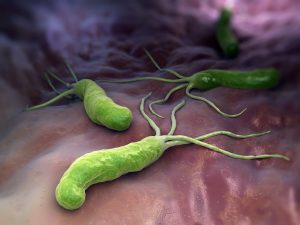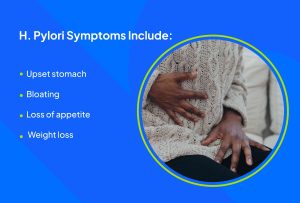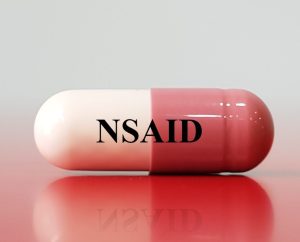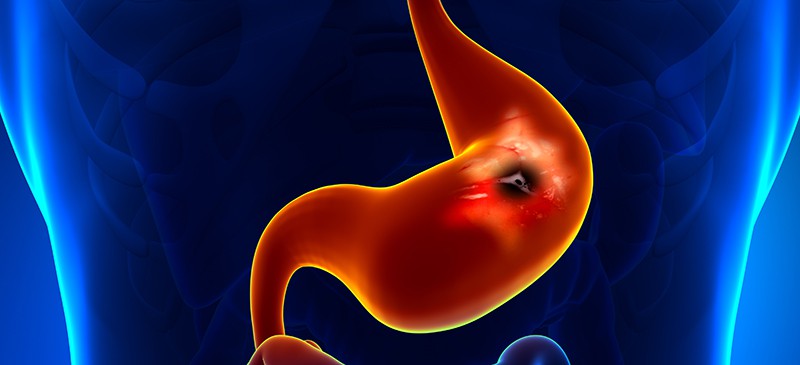Understanding Stomach Ulcer
A stomach ulcer, also known as a peptic ulcer, is a sore or lesion that develops on the lining of the stomach or the first part of the small intestine, known as the duodenum. Stomach ulcers are a type of peptic ulcer, and when they occur in the stomach, they are specifically referred to as gastric ulcers.
Primary Cause of Stomach Ulcers
The primary cause of most stomach ulcers is the bacterium Helicobacter pylori (H. pylori). H. pylori is a type of bacteria that can infect the stomach lining and weaken the protective mucous layer, making the stomach more susceptible to the corrosive effects of stomach acid.
While H. pylori infection is a major contributor to stomach ulcers, other factors can also play a role in their development, including:
- Nonsteroidal Anti-Inflammatory Drugs (NSAIDs): Prolonged use of NSAIDs, such as aspirin, ibuprofen, and naproxen, can irritate the stomach lining and increase the risk of developing ulcers.
- Excessive Stomach Acid: An overproduction of stomach acid or an imbalance between stomach acid and the protective factors in the stomach lining can lead to ulcer formation.
- Smoking: Smoking has been linked to an increased risk of developing stomach ulcers and can also interfere with the healing process.
- Alcohol Consumption: Excessive alcohol consumption can irritate and erode the stomach lining, contributing to ulcer formation.
- Certain Medical Conditions: Some medical conditions, such as Zollinger-Ellison syndrome (a rare condition causing excessive stomach acid production), can increase the risk of stomach ulcers.
It’s important to note that while stress and spicy foods were once believed to be major causes of stomach ulcers, they are now considered to play a lesser role. The discovery of H. pylori and advancements in understanding the role of NSAIDs have shifted the focus of ulcer prevention and treatment.

Common symptoms of stomach ulcers may include:
- Abdominal Pain: A burning or gnawing pain in the mid-upper abdomen, often between meals or during the night. The pain can be relieved by eating or taking antacids.
- Heartburn: A sensation of burning or discomfort in the chest, which may be experienced along with the abdominal pain.
- Indigestion: Discomfort or pain in the upper abdomen, often accompanied by bloating and a feeling of fullness.
- Nausea and Vomiting: Some individuals with stomach ulcers may experience nausea and vomiting, particularly if the ulcer is causing obstruction or other complications.
- Unexplained Weight Loss: Stomach ulcers can lead to a reduced appetite and unintended weight loss.
- Dark or Black Stool: The presence of blood in the digestive tract may cause the stool to appear dark or black. This can be an indication of bleeding from the ulcer.
- Vomiting Blood: In severe cases, bleeding ulcers may lead to the vomiting of blood, which requires immediate medical attention.

Fastest Ways to Cure a Stomach Ulcer
There are no fast ways to cure a stomach ulcer, but there are steps you can take to relieve discomfort and encourage healing. This includes prescription and over-the-counter medications.
Take an OTC medication that blocks acid production
If you experience symptoms of excessive stomach acid, consider an over-the-counter (OTC) medication such as a proton pump inhibitor (PPI) or H2 blocker. These medications can effectively block acid production, providing relief from conditions like heartburn and promoting the healing of stomach ulcers.
Start Antibiotics
If your stomach ulcer is caused by an H. pylori infection, doctors usually prescribe a combination of two antibiotics, such as:
- amoxicillin
- clarithromycin
- metronidazole
Be sure to take all the antibiotics exactly as prescribed, even if you’re feeling better. If you stop taking them, bacteria may remain in your stomach and could even become resistant to the antibiotics.
At least 4 weeks after you finish all the antibiotics, a blood, stool, or breath test will show if H. pylori still exists in your stomach. If it does, a doctor may prescribe different antibiotics to fight the infection.

Try an OTC acid reducer:
For quick relief from heartburn, consider over-the-counter acid reducers like H2 blockers or proton pump inhibitors (PPIs).
Always adhere to recommended dosages and consult a healthcare professional if symptoms persist.
Neutralize your stomach acid:
Antacids can neutralize excess stomach acid, offering temporary relief from indigestion and acidity.
Consume antacids as directed and be aware of potential interactions with other medications.
Stop taking NSAIDs:
Nonsteroidal anti-inflammatory drugs (NSAIDs) can contribute to stomach irritation and ulcers; consider alternative pain relief methods.
Consult with your healthcare provider before discontinuing any prescribed medications.

Drink some Pepto-Bismol:
Pepto-Bismol, containing bismuth subsalicylate, can help alleviate symptoms of indigestion and mild stomach discomfort.
Follow recommended dosage guidelines, and consult a healthcare professional if symptoms persist.
Take a probiotic:
Probiotics can support gut health by promoting a balanced digestive environment.
Consider incorporating probiotics into your routine, especially after a course of antibiotics or if gastrointestinal issues arise.
Stop smoking (if you smoke):
Smoking can exacerbate stomach issues and delay healing; quitting may improve digestive health.
Seek support and resources to quit smoking, and consult with a healthcare professional for assistance.
Avoid alcohol:
Alcohol can irritate the stomach lining; reducing or eliminating alcohol intake may ease symptoms.
Practice moderation, and consult with a healthcare professional if you have concerns about alcohol and your digestive health.













